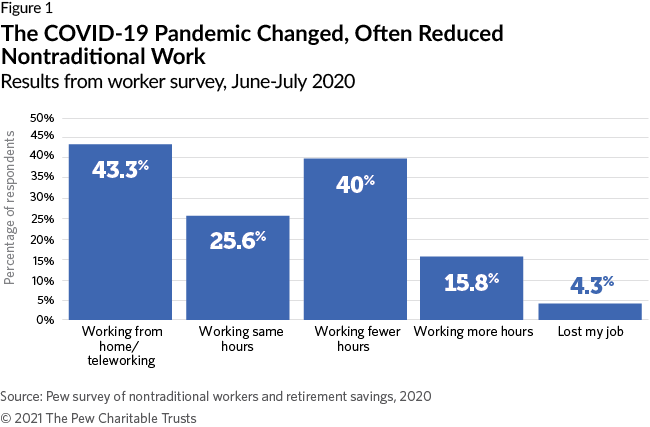The COVID-19 pandemic and efforts to contain it brought record unemployment to American workers, affecting those in traditional as well as contingent jobs, such as online and freelance work and operating a small business. According to the federal Bureau of Labor Statistics, the overall unemployment rate reached 14.7% in April 2020, growing 10.3% from just the previous month—the highest rate and largest month-over-month increase on record, dating back to 1948. Among unincorporated self-employed contingent workers, unemployment increased from 3.4% in March to 9.7% in April before declining slightly to 8.1% in June.
The Pew Charitable Trusts conducted a survey of contingent workers from June 4 to July 1, 2020, just as COVID-19’s economic impact was peaking, and found that 44.3% of respondents had experienced COVID-19-related reductions to job hours or lost their jobs. In addition, 10.5% had tapped retirement savings—making a withdrawal from a workplace defined contribution plan or IRA—between March and June 2020, which underscores the need for policies that help contingent workers, and all workers, shore up their finances with savings that can be used in emergencies.
Among respondents who said that their jobs had been affected by the pandemic, 40% reported working fewer hours in at least one job (see Figure 1), and 4.3% lost one or more jobs. By contrast, 15.8% said they were working more hours than before the pandemic. Only a quarter of contingent workers (25.6%) said they were working the same hours as before the pandemic. Additionally, 43.3% of survey participants said they had begun teleworking or working from home since the pandemic.
The workers in Pew’s survey were a varied group: 37.6% had a single, contingent job, 40% had a mix of contingent and traditional jobs (“mixed work”), and almost a quarter (22.4%) had multiple contingent but no traditional jobs (“multiple contingent jobs”). Further, 52.9% had two or three jobs and 9.5% had four or more jobs. Notably, the reported impacts were felt across the board: The survey found no significant differences by gender, race and ethnicity, education, age, or whether the primary job—defined as providing the most income over the past year—was contingent or traditional.
Reduced hours and job losses probably resulted in lost income and contributed to the drawdown of retirement assets among contingent workers. Although the federal government provided relief from early-withdrawal penalties for qualified workers whose health or jobs were affected by the pandemic, reduced assets may mean reduced investment growth and savings in retirement.
The survey did not ask whether COVID-19 had caused contingent workers to lose access to a retirement savings plan, but it is likely that some did when they lost a job.
Alison Shelton works on The Pew Charitable Trusts’ retirement savings project.
"had" - Google News
April 22, 2021 at 12:58AM
https://ift.tt/2QRxJju
More than 40% of Contingent Workers Had Hours Cut or Lost Jobs Because of COVID-19 - The Pew Charitable Trusts
"had" - Google News
https://ift.tt/2KUBsq7
https://ift.tt/3c5pd6c
Bagikan Berita Ini















0 Response to "More than 40% of Contingent Workers Had Hours Cut or Lost Jobs Because of COVID-19 - The Pew Charitable Trusts"
Post a Comment